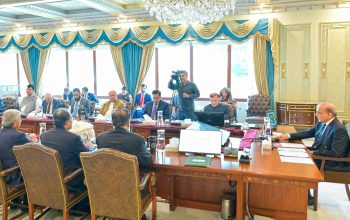Pakistan’s economy – which remained a hotbed of developments in recent months – is back in the frontline with a number of measures either in the pipeline or already enforced.
This kicked off with the meeting of Chief of Army Staff (COAS) General Asim Munir with a delegation of businessmen in Lahore earlier this month. As per reports, during the meeting, the army chief took the business community into confidence regarding the future plans of the government.
In a country like Pakistan, where the armed forces have played a pivotal role throughout its history, a meeting by the current army chief is not an uncommon occurrence. His predecessors also remained in touch with the business community.
However, after the COAS meeting, several developments were to take place. The State Bank of Pakistan (SBP) ramped up its efforts to clip the wings of the high-flying dollar and announced a list of “structural reforms” targeting the Exchange Companies (ECs).
The announcement of structural reforms came as no surprise and was much-needed as Pakistan’s foreign exchange market remains marred by the ills of speculation and hoarding.
This keeps the currency highly volatile and rather than being driven by economic fundamentals the value is dictated through speculation and basically at the whim of some big players, which was witnessed in recent weeks as the PKR crossed 330 against the US dollar in the open market.
MCB Bank joins UBL and Meezan, says it will establish wholly-owned Exchange Company
What are these reforms? Among the measures announced is the central bank directive for the commercial banks to establish their own ECs, as wholly-owned subsidiaries. Moreover, the SBP also directed to raise the minimum capital requirement [MCR] for ECs from Rs200 million to Rs500 million.
Such reforms indicate that the government intends a consolidation of ECs while bringing the largely unregulated foreign exchange sector closer to the central bank’s ambit.
Firstly, the increase in MCR would compel small-scale ECs to either raise their capital requirement, which is no easy task as they will have to pass through more stringent regulations or surrender their businesses to larger companies, thus reducing the number of players in the market and making it easier to manage.
Secondly, at present, the foreign exchange business is being operated mostly by private entities and only a few are run by commercial banks i.e. NBP and HBL, which leads to higher chances of currency manipulation.
However, after SBP orders, we shall witness the arrival of commercial banks, a highly regulated entity, into the forex market.
This is expected to promote market efficiency and transparency.
“Banks working as ECs would be under the radar of a regulator i.e. SBP,” said Sana Tawfik, an analyst at Arif Habib Limited.
“This would improve KYC [know your customer] requirements, which is also in line with the Financial Action Task Force [FATF] requirement, as a lot of money laundering is done through informal markets,” she said.
UBL says will establish wholly-owned Exchange Company
Moreover, the SBP would be more in sync with the market dynamics, allowing it to determine the demand and supply position of various currencies more effectively.
Apart from the central bank measures, the caretaker setup also announced taking administrative steps to tighten the screws around smuggling and hoarding of currency and as a result, countrywide raids were reported with scores of illegal currency exchanges being shut down and foreign currency worth millions confiscated.
“I believe the curbing of smuggling, especially in the western border areas, will have a major impact with regards to curtailing the unlawful practice of hundi and hawala” said Abdullah Umer, a market analyst. “Markets near these areas [border areas] are not that regulated thus the curbing of these businesses is essential.”
The actions have irked hoarders and proponents of the illegal market, which was reflected in the massive weakening of the US dollar against the Pakistani rupee, especially in the open market.
Exporters too, are selling their proceeds at ready counters and the pressure on the inter-bank is also subsiding.
“I think it is the right step as these are long pending serious issues for the economy,” says Fahad Rauf, Head of Research at Ismail Iqbal Securities Limited. “If it is implemented in letter and spirit, it will benefit the currency and local businesses.”
Apart from tightening the noose on currency exchangers, the authorities have also initiated a wide-scale crackdown against electricity theft.
Power sector is Achilles heel of economy
Although clamping down on power theft should be a routine practice and not something to be highlighted, it is pertinent to mention that Pakistan sustains annual losses to the tune of Rs589 billion or nearly $2 billion on account of electricity theft and transmission and distribution losses.
This is a criminally massive outflow of the precious exchequer, which is adding to the woes of the debt-ridden energy sector in the form of a bulging circular debt, thus, it is pivotal to put a stop to these practices with an iron fist.
The current setup, being a caretaker government, enjoys the luxury of not facing any political pressure. They have no political capital to lose or key allies to cater to, a scenario that has been way too commonly faced by the elected governments in the past.
Therefore, it is essential that the announced measures are not just eyewash, and the government should continue with its direction which in the coming years could lay a foundation of sustainable growth for Pakistan.
The article does not necessarily reflect the opinion of Business Recorder or its owners
Read the full story at the Business Recorder - Latest News website.



